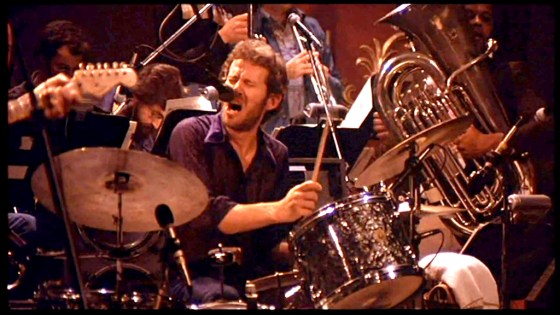OK, uh, somebody hipped me to the news that this is NOT a movie teaser, but has to do with an upcoming Super Bowl ad. Good. This is good… it means somebody out there is thinking about it, and maybe the folks who own the rights would like to do a deal with somebody who has the right idea. Which would be me. So Hollywood, if you’re calling, here I am… In the meantime, here’s the post I wrote when I thought that was a for-real mini-preview…
I’m not being facetious. I think my project might have had a chance — with the right connections, and with cooperation from those holding the rights to the first movie — and now it’s gone for good. I’m actually sort of depressed about this.
For several years, I’ve been kicking around an idea for a movie. It’s a really good idea. Good enough that my daughter gave me a “Scriptwriting for Dummies” book about four years ago to encourage me to go ahead and write it. But I was so busy then at the paper, and then I was unemployed (which is really, really time-consuming) and since then I’ve been trying to learn to be a Mad Man and develop my blog into a paying concern and occasionally doing freelance gigs, and, basically, it didn’t get written.
So now Hollywood has gone ahead with the project without me. And I’m pretty sure it’s not going to be nearly as good as if they’d heard my pitch.
My pitch would have been this…
Title: “Ferris Bueller’s Off Day.” Which is better than “Ferris Bueller’s Day Off 2.” Way better.
Mine was to be a political satire. For the simple reason that I can only think of one thing Ferris would have done with his peculiar talents. He was made for it. Like Tom Sawyer. Don’t you assume Tom would have gone into politics? Of course he would have. Same with Ferris — a preternaturally gifted politician. The kind who drives his opponents insane because he has this uncanny rapport with voters, everything slides off of him, and he always comes back — kind of like Bill Clinton.
In my script, Ferris would be a member of Congress. Not a senator. That would be too grand. Just another member of Congress, enjoying the perks of office, saying what he wants, voting how he wants, and getting repeatedly re-elected no matter what he does. Which, as I say, infuriates his political opponents. Such as Edward R. Rooney.
Mr. Rooney, having abandoned education as unsuitable to his talents, is an assistant chief of staff (actually, political director) for the incumbent president. He has a wonderful office in the West Wing. Great view. Grace has accompanied him on his career, and is still his secretary. All would be right with his world, except for one thing: Ferris Bueller. Still. Ferris, through no effort or merit of his own, is talked about constantly as a potential challenger to the president in the upcoming election. He doesn’t encourage this talk, but he enjoys it. And everything he does seems to boost him in the polls, and make the president — or at least, his assistant chief of staff — look foolish.
Mr. Rooney has collected some major dirt on Ferris. I haven’t decided what Ferris has done (and he HAS done it; our boy is not innocent), but whatever it is, he’s done it “nine times.” Instead of to Ferris’ mom, Ed rehearses saying “nine times” to the media. At some point, he says it to Ferris’ administrative assistant, Cameron, relishing the threat. (I’m toying with the idea of the scandal having something to do with contributions to Ferris’ campaign fund from Abe Froman, the Sausage King of Chicago.)
OK, I’ve set the background. Here’s what’s happening as the movie opens… Ferris is lying in bed, glassy-eyed. Only this time, he’s not faking. Some of the scandal has broken over him at a time when he’s vulnerable. His marriage to Sloan appears to finally be over, due to his proclivity for — remember how, after asking Sloane to marry him, even at the moment when his world is about to come crashing down on him, as he’s racing to get home ahead of everybody, he stops and turns and introduces himself to the sunbathing girls? Well, that sort of thing has caught up with him.
He’s convinced that all his mojo is gone. Finally, at a critical moment in his career as the incomparable Ferris, he’s having an off day. An off day when all sorts of things he got away with in the past is catching up with him. Hence the title.
Meanwhile, Cameron — who straightened himself out and become a (relative) bundle of confidence after having that little chat with his Dad about the Ferrari — is the one calling Ferris and trying to get him to stop moping and take advantage of the opportunities that lie before him. Sure, there’s a scandal to deal with, but Cameron knows Ferris can deal with it — if he’ll just snap out of this funk.
Oh, yeah — Jeannie is an investigative reporter on The Hill. Something in her childhood instilled in her a deep-seated need to catch other people doing things that they shouldn’t. And she’s not partial. Investigating Ferris is fine with her, even though they made up at the end of the last movie.
Spoiler alert: At some point in the film, Jeannie starts to look into some irregularities involving Mr. Rooney. Also, at some point, Ferris does snap out of it and find a way out of the jam he’s in. Because, you know, off day or not, he’s Ferris Bueller.
Along the way, there’s a lot of fun with cameos from real-life Washington people talking about how awesome Ferris is, plus some regular man-in-the-street interviews. For instance, there’s an interview with a guy who works in the congressional parking garage, and the first question is, “Do you speak English?,” to which he replies, “What country do you think this is?” Simone, too, will be interviewed, and her reply will be something like her “31 flavors” line from the first movie.
Remember the kid who woke up with his face in a puddle of drool on his desk? He’ll do the same in this movie, only his desk is on the floor of the House.
Ben Stein will be in it. Charlie Sheen will do a cameo…
Look at me. I keep saying “will,” when I should say, “would have.” Because my chance has passed me by.
I know I’m going to see this movie, and I’m probably going to hate it. Because I’ll know what it could have been…


















